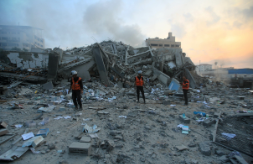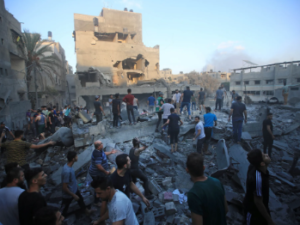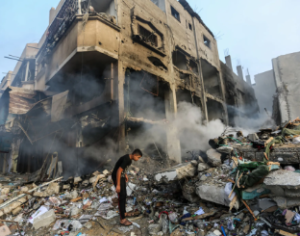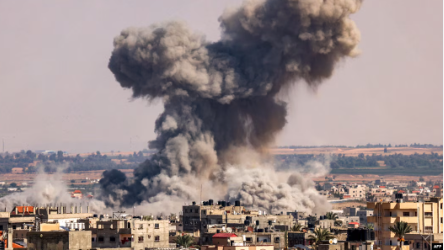Protests Erupt Nationwide as Israelis Accuse Government of Failing to Secure Hostages
Israel is on the brink of a general strike following a night of massive protests sparked by public outrage over the government’s handling of the hostage crisis with Hamas. The strike, called by the country’s largest labor union, Histadrut, is a direct response to growing anger towards Prime Minister Benjamin Netanyahu and his administration.
Protests Erupt After Hostages Found Dead
The protests began after the Israel Defense Forces (IDF) discovered the bodies of six hostages in an underground tunnel in Gaza. The victims were identified as Carmel Gat, Eden Yerushalmi, Hersh Goldberg-Polin, Alexander Lobanov, Almog Sarusi, and Master Sgt Ori Danino. According to the IDF, the hostages were killed shortly before Israeli troops reached them on Saturday.
The deaths of these hostages have triggered widespread outrage across the country. Tens of thousands of Israelis took to the streets on Sunday, rallying in cities like Tel Aviv and Jerusalem, demanding that Netanyahu take more decisive action to secure the release of the remaining hostages held by Hamas.
Public Anger Directed at Netanyahu
The protests have been largely peaceful, but tensions ran high as demonstrators blocked major highways and broke through police lines in Tel Aviv. Some protesters donned masks depicting Netanyahu, chanting, “Alive, alive, we want them alive,” while others held signs reading, “You are the head. You are to blame.”
Protesters, many of whom were wrapped in Israeli flags, voiced their frustration, accusing the government of failing to prioritize the lives of the hostages. The call for a general strike on Monday reflects the depth of public anger, with Histadrut leader Arnon Bar-David criticizing the government, saying, “We are getting body bags instead of a deal.”
Government Response and Strike Uncertainty
The Israeli government has reacted strongly against the strike call, with far-right Finance Minister Bezalel Smotrich accusing the union of playing into Hamas’s hands. Despite the government’s objections, the strike is seen as a powerful statement of the public’s dissatisfaction. However, it remains uncertain how widely the strike will be observed, as several cities and municipalities have already announced they will not participate.
Humanitarian Efforts in Gaza Amid Ongoing Conflict
As protests and strikes dominate the headlines, the humanitarian situation in Gaza continues to worsen. The United Nations reported that a campaign to vaccinate 640,000 children against polio began successfully on Sunday, despite ongoing military operations. The vaccination campaign relies on localized pauses in fighting, which are precarious as the conflict between Israeli forces and Hamas persists.
Continued Uncertainty as Crisis Unfolds
The situation remains fluid, with public anger showing no signs of abating. The call for a general strike underscores the deepening crisis in Israel, as citizens demand more from their government in the face of ongoing violence and loss.

1. Historical Context: The Hostage Crisis
- October 7, 2023, Hamas Attack: On October 7, 2023, Hamas launched a surprise attack on southern Israel, kidnapping 251 people and killing 1,200 others. This attack marked one of the deadliest escalations in the Israel-Palestine conflict in recent years, leading to a severe military response from Israel.
- Israel’s Military Response: Following the attack, the Israel Defense Forces (IDF) launched a significant ground and air offensive in Gaza aimed at dismantling Hamas’s infrastructure and rescuing hostages. The ongoing military operations have resulted in a high civilian death toll in Gaza, with the Hamas-run health ministry reporting over 40,738 deaths since the offensive began.
- 2. Details on the General Strike
- Histadrut’s Role: Histadrut, Israel’s largest labor union, represents a significant portion of the country’s workforce, including government employees, healthcare workers, and transportation staff. The union’s decision to call for a general strike reflects the depth of the public’s frustration and could have a widespread impact on daily life across the country.
- Potential Impact: The strike could lead to the shutdown of public services, including transportation, healthcare, and education, depending on the level of participation. Some cities and municipalities have chosen not to participate, which could lead to an uneven impact across the country.
- Government’s Reaction: Finance Minister Bezalel Smotrich’s accusation that the union is playing into Hamas’s hands highlights the deep political divisions in Israel. The government’s strong response to the strike call indicates the high stakes involved, as the Netanyahu administration grapples with maintaining public order and authority.
- 3. Public Sentiment and Political Implications
- Netanyahu’s Approval Ratings: The ongoing crisis has severely impacted Netanyahu’s approval ratings, with many Israelis expressing dissatisfaction with his leadership during this period. The protests and the strike reflect a growing sense of betrayal and frustration among the public, particularly regarding the government’s perceived failure to prioritize the lives of Israeli hostages.
- Political Divisions: The crisis has also exposed and deepened existing political divides within Israel. Netanyahu’s government, which includes far-right elements, has been criticized for its hardline approach, which some argue has exacerbated the conflict rather than resolving it. The general strike and protests could potentially lead to political repercussions, including calls for early elections or changes within the government.
- 4. Humanitarian Efforts and Civilian Impact in Gaza
- UN Vaccination Campaign: The United Nations has launched a vaccination campaign targeting 640,000 children in Gaza to prevent a potential outbreak of polio. This effort is crucial given the deteriorating humanitarian conditions in the territory. The vaccination campaign is being conducted during temporary pauses in fighting, which underscores the challenges of delivering humanitarian aid in a war zone.

- Civilian Casualties and Displacement: The ongoing conflict has led to significant civilian casualties and displacement within Gaza. According to the Hamas-run health ministry, over 40,738 people have been killed, and thousands more have been injured or displaced. The destruction of infrastructure, including hospitals, schools, and homes, has compounded the humanitarian crisis.
- 5. International Reactions and Diplomatic Efforts
- Global Response: The international community has reacted with concern to the escalating violence. Countries like the United States, European Union members, and regional powers have called for restraint and urged both sides to engage in dialogue. However, diplomatic efforts have so far failed to produce a ceasefire or significant de-escalation.
- Human Rights Concerns: Human rights organizations have raised alarms over the high civilian death toll in Gaza, calling for investigations into potential violations of international law. The Israeli government has defended its actions as necessary for national security, but the global debate over the proportionality of Israel’s response continues






